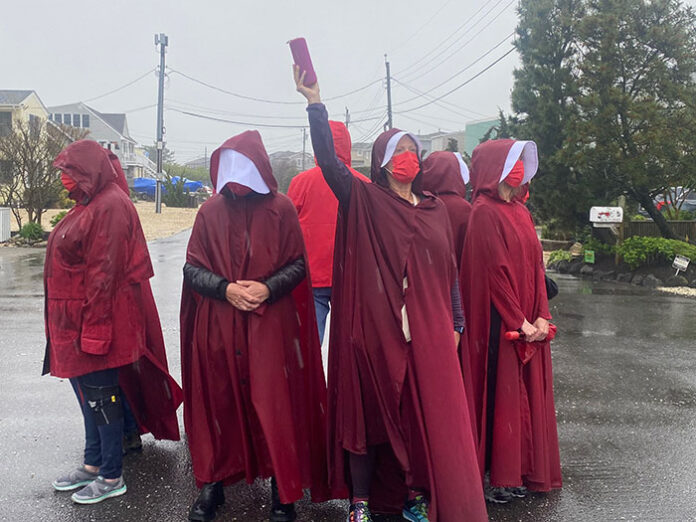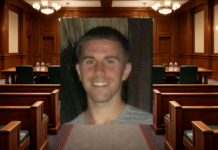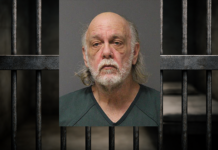
LONG BEACH ISLAND – The Sounds of Silence literally rang out as a dozen protesters formed a circle outside the vacation home of Supreme Court Justice Samuel Alito.
The Southern Ocean Times is deliberately withholding the neighborhood where Alito maintains a residence. A public records database that previously documented the address is now devoid of every home listed on the small street.
Donned in raven cloaks with white bonnets shielding their view, the protesters wore scarlet face masks. A lone gentleman in a red jacket joined the gathering of women who came to express their outrage at the recently leaked opinion written by Alito that stands to overturn Roe v. Wade.
Despite the torrential rains on Saturday, the demonstrators visited three separate cul-de-sacs within the same Long Beach Island community. One was directly in front of Alito’s home, while the others were blocks away. The costumed handmaidens stood silently in unison as an updated version of Simon & Garfunkel’s “The Sounds of Silence” played for precisely two and a half minutes.
No one carried signs or made a disturbance as select homeowners ventured outside. Local police showed up on the scene and thanked the demonstrators for the civil nature of their protest.
Without a doubt, a striking difference contrasts Disturbed’s rendition of the 70s hit and the original. The music takes listeners to a darker place, with a foreboding tone – as the lyrics highlight the danger of not speaking out.
“People talking without speaking….People hearing without listening…Silence like a cancer grows.”
Some of the demonstrators spoke on the condition of anonymity as they expressed concerns for their personal safety. Most hold professional jobs within the community, and at least one has already received threats after she offered opinions contrary to some locals.
The group of protesters collectively said they were outraged that the country was literally headed backward in its thinking. The organizer of the event shared the reason demonstrators across the country have chosen to mirror images from “The Handmaid’s Tale” to make their point.
“The TV show and the book are based upon a dystopian society where men are forcing women to basically be silent and subservient,” said the Surf City resident.
As she pointed to the large white brim around her costume’s bonnet, the speaker likened its intent to blinders placed on horses. She said the hats were designed to only allow handmaidens to see what men deemed appropriate to view.
In the television show, there are masks, and some women have rings in their mouths because they are silent. While the organizer acknowledged that some protesters have taken to screaming and yelling because they are angry, others felt it critical to highlight the danger of remaining silent.

“We’re angry too, but we also feel there’s a message in being silent because this is where we might be headed,” the spokeswoman shared. “If we don’t get young people to vote and remove people from positions of authority that are anti-abortion, it will not stop there. It will continue on to same-sex marriage, LGBTQ rights, and even equal education for children.”
The Surf City woman said she could not fathom going back fifty years to deny women the protection to make choices about their own bodies.
“Just because we are pro-choice does not mean everyone is pro-abortion,” stressed the resident, who has already received alarming messages that she reported to law enforcement authorities. “My choice is my choice – and your choice is your choice. I am fighting for the right for everyone to make a choice based on body autonomy. Every woman should be able to make the choice based on their own health and safety.”
Barbara Crystal retired as a high school teacher last year and explained the reasons she joined the demonstration.
“I believe that a woman should have dominion over her body and choices,” said Crystal. “I am also here for my daughters as I believe they need to have the same rights – as well as my future grandchildren and for all young ladies and women.
“We have had that voice and to see that taken away is something that should not happen,” Crystal continued. “I’m here for the future.”
Douglas Shearer shared a story to explain why he joined the protest as the sole man. He recalled the pain a neighbor experienced in the early 1950s because she did not have the choice to have an abortion.
According to Shearer, the mother could not even acknowledge she had a child, who was fostered off to others.
“She lived in shame with her parents looking at her like she was wearing a scarlet letter,” said Shearer. “The freedom of being able to choose to have an abortion at that time was denied. She’s lived the rest of her sixty plus years in shame.”
Leaked Supreme Court Opinion
POLITICO released the first draft of the leaked majority opinion delivered by Alito in Dobbs v. Jackson Women’s Health Organization earlier this month.
While the 1973 Roe v. Wade case is the better-known Supreme Court decision regarding abortion rights, the court revisited it in Planned Parenthood of Southeastern Pa. v. Casey. The latter case was decided in 1992, and Alito writes that the three justices who wrote the controlling opinion “might have (had) reservations about whether the Constitution protects a right to abortion.”
In the Dobbs matter, the State of Mississippi has asked the Supreme Court to uphold the constitutionality of a law that generally prohibits abortion after the fifteenth week of pregnancy. A total of 26 states have asked the court to leave abortion laws in the hands of state legislators.
“We hold that Roe and Casey must be overruled,” writes Alito in the draft opinion. “The Constitution makes no reference to abortion, and no such right is implicitly protected by any constitutional provision, including the one on which the defenders of Roe and Casey now chiefly rely – the Due Process Clause of the Fourteenth Amendment.”
The first half of the 98-page majority opinion analyzes prior court opinions regarding whether the Constitution confers the right to an abortion or if other precedents support it. Alito states that until the latter part of the 20th century, there was no support in American law for a constitutional right on even a state level as far as abortion.
In furthering the argument that Roe “either ignored or misstated the history,” Alito cites from as far back as a 13th-century treatise wherein an abortion was a crime after “quickening.” This was described as the first felt movement of the fetus in the womb – between the “16th and 18th week of pregnancy.”
Other common law treatises referred to by Alito include Sir Edward Coke’s 17th century assertion that abortion of a quick child was “murder” if the “childe be born alive” and a “great misprision” if the “childe dieth in her body.”
The leaked opinion concludes that “a right to abortion is not deeply rooted in the Nation’s history and traditions.”
Alito characterizes Roe as “egregiously wrong and damaging,” saying that it was on a collision course with the Constitution from the day it was decided – with the Casey case perpetuating the errors.
According to the draft opinion, those who sought to “advance the state’s interest in fetal life could not advance the state’s interest in fetal life – could no longer seek to persuade their elected representatives to adopt policies consistent with their views.”
The draft opinion ends with a statement that abortion presents a profound moral question. The majority opinion is that the “Constitution does not prohibit the citizens of each State from regulating or prohibiting abortion.”
New Jersey Law
As it now stands, New Jersey is not one of the 26 states that plan to ban or limit abortions. In a press release in January, Governor Phil Murphy spoke on the codification of the Freedom of Reproductive Choice Act as state law.
“In New Jersey, we trust each individual person to make their reproductive choices for themselves,” said Governor Murphy. “With Roe v. Wade under attack, today’s historic legislation makes clear that New Jersey’s position in supporting the right to reproductive choice remains protected. Together, with expanding contraception coverage, these two pieces of legislation serve to meaningfully and tangibly increase access to reproductive health care, and ensure that New Jersey residents are now, and will remain, in control of their reproductive choices.”






